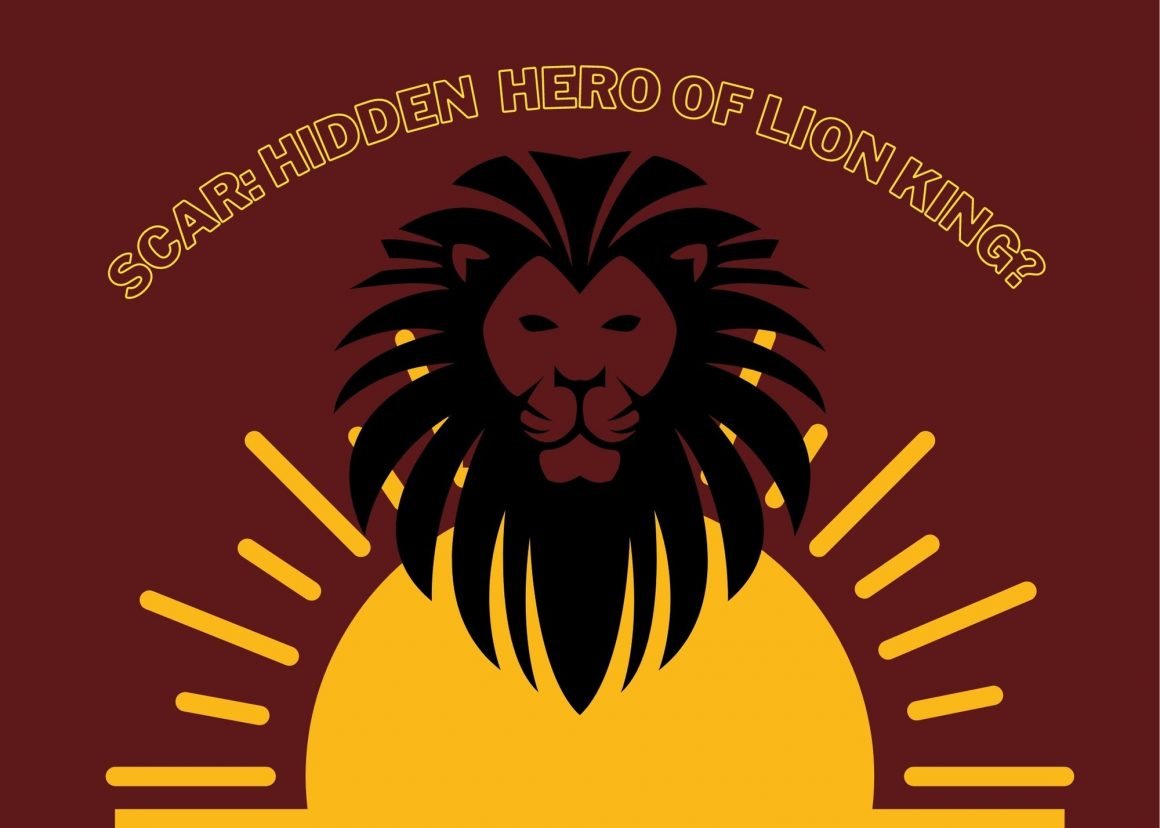
Why Scar is the hidden hero from The Lion King
By Christian Lowry, April 27 2022—
One way that inequality and its consequences are maintained is by presenting them as the moral — if not natural — way of things. Disney’s animated film The Lion King, released in 1994 (remade in 2019), provides one such example. As of 2020, it was the 7th highest-grossing film of all time.
The story is known to millions. The upstanding king Mufasa and the young prince Simba are the subjects of envy by Mufasa’s younger brother Scar, who desires the throne. Thus, he orchestrates the death of Mufasa and the exile of Simba. However, Scar allows his loyal hyena followers into the Pride Lands, quickly exhausting its resources. Eventually, Simba forcibly reclaims the throne, rescuing the kingdom from collapse.
Another view of Scar is plausible. To fully understand him, one must understand what he is opposing. Under Mufasa, the kingdom was ruled from Pride Rock by an oligarchic gang of lions and lionesses. The land and its inhabitants were the personal property of its rulers. Unlike the old feudal systems where a class of poor serfs eked out a living that was then taxed, the serfs of the Pride Lands were literally devoured by their lords.
Moreover, a massive population of hyenas are ghettoized in a tiny elephant graveyard, where they experience absolute poverty in a kingdom of plenty. Their movements are closely policed and they are ruthlessly expelled when found. The feline oligarchs, however, can enter the graveyard at will, as evidenced when Mufasa rescues Simba after the latter trespasses the hyenas’ territory, further adding to their constant humiliation. The members of the ruling class literally fatten themselves on the sustenance that is denied to the hyenas, who suffer in inverse proportion to the gluttony of the lions.
Scar’s alleged villainy stems from his killings and apparent thirst for power. However, in an undemocratic society, there weren’t many alternatives. This is not the fault of the rebels but of the ruling elites who rig the game against any attempt to help the masses. By fighting for the hyenas, Scar becomes a heroic rebel against an oppressive government. While one might readily say that he simply exploited the hyenas to gain power for himself, three arguments obstruct this view.
First, instead of enjoying his elite privilege, he spent most of his time among the deprived hyena community, constantly risking punishment for his attempts to organize them. Second, his status among the hyenas indicated he had provided for them for some time and it is unlikely that they would have tried to kill Simba or Mufasa on his orders without a deep reservoir of trust. Third, he could have continued to banish them after taking power, thereby increasing his prestige. Thus, his promise that “you’ll never go hungry again” appears to have been his intent rather than a momentary promise.
Eventually, we see the alleged results of Scar’s mismanagement, including the depletion of the kingdom’s food and water, the decay of its landscape, the censorship of Mufasa’s name and the mounting discontent of the hyenas. One might say that Scar was responsible for these crises due to his chaotic integration of the hyenas.
However, as soon as Scar dies, rain replenishes the kingdom, as though the water cycle depends on the king’s personality. If anything, he showed dynamic leadership by sending hunting parties to look for food, a strategy that appears to have mitigated the crisis until he is informed that “the herds have moved on.” Yet there would be little rationale in leaving Pride Rock if even the hunting parties could not find food even outside the kingdom.
Poverty was much more prevalent under Mufasa, who simply removed it from public view, allowing it to persist for generations among the hyenas. However, as soon as the lions began to experience even short-term hardship among an equally fed population, hunger suddenly became a problem that merited Scar’s removal. If I understand the critics, to keep the elite from hungering for a short period, the commoners must hunger constantly.
Even for Scar, there were substantial concessions. No collective punishment was inflicted on easy targets such as Sarabi or Simba’s fiancée Nala. The rest of the royal family, minus Mufasa and Simba, retain their royal status and residence at Pride Rock. No such civilities are present when Simba retakes the throne. By the events of The Lion King II: Simba’s Pride, Scar’s family and followers have been exiled to the squalid, inhospitable badlands once known only to the hyenas.
This writing invites the reader to view a major work of cinema not just as a political drama but as a people’s history. Here, I wish to draw attention to the criteria by which heroes and villains are designated, alternative perspectives on the status quo, the methods used to change it and the pathways available for change.
This article is part of our Opinions section and does not necessarily reflect the views of the Gauntlet’s editorial board.
